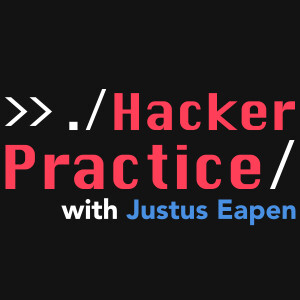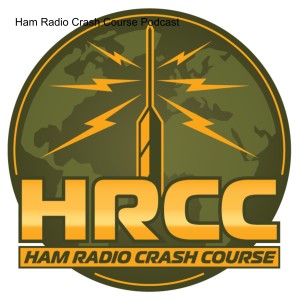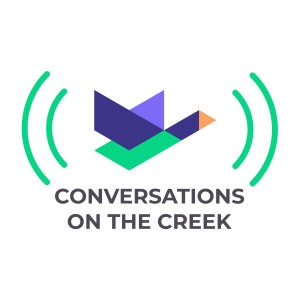

Hacker Practice: GROWTH, SYSTEMS, and RISK for Startups and SMB
https://hackerpractice.libsyn.com/rssEpisode List

Peter Dunbar: B2B Sales and the Art of Conversation
Peter Dunbar is a master conversationalist. I’ve seen him strike up engaging discussions with everyone from valets to Fortune 500 CEOs. That alone would make him impressive, but our guest today is also a hard-core hacker. I first knew him as the head of hardware at a start-up we both worked at. He graduated high school at 16 to pursue a life of engineering and entrepreneurship. His hacking experience is extremely diverse. Links: known.creative Core dna Reach out to Peter: Email: peter@knowncreative.co Cell: +1 (207) 649-5037 – only if you want to have a conversation! Notes [3.30] Peter describes how he has been able to get work through the art of conversation (without presenting a resume) Peter uses conversation as a problem solving tool to “hack” an outcome or a goal [4.45] What hacking means to Peter Hacking is a “lifestyle” [9.30] Peter describes how an unforgettable conversation with his thesis advisor changed the course of his career [11.15] Peter describes the relationship between software and hardware when developing the Pavlok wearable [15.45] Why resourcing is the biggest challenge in building a new hardware product [17.30] Why running a crowdfunding campaign to launch a new product without any traction is a big mistake [18.45] How the art of conversation has allowed Peter to transition from engineering to sales [21.30] Why it’s important to adopt a sales mindset of helping the customer succeed along with you. How a conversation with a support engineer was the catalyst for Peter being able to close a sales deal for one of the world’s largest e-commerce consumer brands Peter was able to engage the CXO level by pointing out that their marketing strategy was being stonewalled by poor website architecture, preventing them from being able to develop a best practice ecommerce platform. [27.50] How Peter called into a radio station to pitch to the GM of the Massachusetts Bay Transportation Authority (MBTA) while he was being interviewed on air. This opportunity bias helps Peter take advantage of such situations [31.30] Why the feedback loop is so important in improving your sales process, especially in the face of rejection [35.00] Peter discusses known.creative, a digital agency in Boston, Massachusetts where he now heads up sales. How partnering with Core dna – an all-in-one SAAS Digital Platform has allowed known.creative to scale and offer global enterprise offerings to companies, at drastically reduced development and implementation costs [37.50] Peter shares his thoughts on the marketing agency model Why it is most important to be able to show how your solution will drive a positive ROI for your client. E.g. There is no point “selling” a $50k website if it won’t turn a positive ROI for your client The importance of being frank about business relationships and focusing on making money. Building and sustaining a long term relationship is critical in enabling both parties to make more money [41.40] Why many ecommerce companies are naive about threats to their online platforms and IP [46.30] Peter explains why security for the SMB/SME market is going to be a huge growth market [48.40] How the legalisation of marijuana in Massachusetts is going to drive a new wave of tech/digital opportunities in the commercial landscape (outside of recreation) [51.00] Why updating your website and making the effort to have a great digital presence, is so important, in building trust and engaging your customer base [52.00] Why known.creative uses its own brand and website as a testing ground for solutions before engaging customers [54.50] Reach out to Peter: Email: peter@knowncreative.co Cell: +1 (207) 649-5037 – only if you want to have a conversation!

Naphtali Visser - Kindness, The Art of No Thought, and Photography
Naf Visser is the CEO of Humans Working, an executive coaching firm that I worked with last year when I was managing the innovation department at Boston’s fastest growing tech agency and trying to get a nut butter company off the ground at the same time. He helped me manage that non-trivial workload through a mindfulness practice that I call the Art of No Thought. He’s also the founder of the Holocaust Kindness Project which we’ll talk about. I’m so glad to welcome one of my closest friends to the show: Naphtali Visser, but we call him Naf. LINKS: Humans Working www.peacepodcast.com Holocaust Kindness Project Jayson Gaignard’s Mastermind Dinners Loyal Nine Restaurant Humus Bar Mara Gleason FIND: naf@humansworking.co [3.00] Why reading Jayson Gaignard’s Mastermind Dinners spurred Naf started inviting people for dinners. Naf talks about why it’s so important to practise kindness [4.40] How to practise kindness without expecting anything in return [6.30] Naf discusses meeting Justus at Loyal Nine Restaurant [8.45] Why Naf believes you can’t “teach” kindness and that kindness begins with personal thought [11.30] Naf discusses his prime motivator for doing what he does Naf is driven by helping people [12.40] Why Naf’s bad experiences in the corporate world lead to him starting an internet consulting agency at age 23 Main criteria was to have a place where people (employees) would like to come. Business was successful for more or less 4 years At the 4 year mark the company had a black swan event (major client failed to pay a whole lot of owed money and the economy tanked). This happened around September 2001. [16.50] Naf describes the meeting where he told his employees the business was closing and how this changed everything Spoiler: No one left, everyone refused to leave. Why? Incredible culture and trust. Because Naf valued his employees as family, and treated them as such, they treated him as family too. Your people are your most important asset. How Naf’s staff worked for nothing over the next two months and why this period was the most transformative of his life How Naf ended up giving one client an 80% discount on a job, in return for upfront payment, so he could help a staff member meet their month’s rent [20.30] How Naf’s persistence and focus on helping his staff lead to his company landing its biggest contract in its darkest moment Ultimately merged with a design company Naf believes kindness and willingness to help was the key [23.00] Why giving employees unlimited vacation leave and other tangential work benefits can be a bad idea It starts with the principles behind an initiative. If staff do not inherently understand this it will not work. Naf deconstructs his actions during this challenging period Naf realised that “kindness” and “no thought” were the guiding principles Why resilience is so important in the process of life Naf believes suffering comes from not understanding that you can be resilient [30.45] Discussion on the three principles: Mind, consciousness and thought “Confidence is going into a situation knowing I will be ok no matter what” “With a clear mind, much more magic can happen” Letting the mind calm down and letting a solution flow in can be very powerful [37.30] Why “letting go” and allowing yourself to “lose control” can be the best way to handle problems [39.00] Naf describes the connection between food and kindness. He has a podcast called Peace Photos and Pizza Everyone needs to eat. During peace or during war, everyone stops to eat. This allows the time to reflect. Restaurant in Israel called Humus Bar that gives 50 percent discount on hummus to a table where Arabs and Jews sit together Holocaust kindness project Why food can bridge cultural divides Justus discusses his theory about doner kebabs solving the issue of Islamophobia [45.00] Naf discusses thought. Everything is invented through thought. Recognise that there is no right or wrong, only “thought” Reality is created through thought, moment to moment [47.50] Think of thought as spiritual energy Naf describes his theory how thoughts aren’t created by you. Why having a clear mind is the best way to handle bad things [54.30] Why overthinking leads to inauthentic behaviour [56.30] Naf describes how to get a clear mind. Spoiler: It is in our natural state. It isn’t something that you seek. Why meditation or other extrinsic influences don’t get you to your natural state [1.02.00] Naf describes his company Humans Working which he founded as a result of his life experiences [1.05.00] Naf discusses why everyone has their own unique recipe to follow “When you do the thing that you think you are called to do, you learn so much more about yourself” Naf discusses the concept of happiness and why it’s not something you find “There is no place that will make you happy.” If you aren’t happy there is nowhere you can go that will clear your mind or make you happy. It is an internal state of mind as happiness is simply a state of mind. “Happiness is available at your fingertips.” It doesn’t come from accumulation, relationships, money or external influences. Happiness is being. [1.08.30] Naf discusses the three principals “prove, please, protect” - Mara Gleason “Kindness and love are a natural state when you aren’t wrapped up in fear” There is no amount of “anything” that can get you to feel a certain way [1.21.20] Naf gives examples of how personal experiences come from “thinking” not from someone else’s actions [1.25.10] What makes good photography Everyone has their own experience when they see something and this doesn’t come from the image Light, moment, composition Evoke an emotion and convey an opinion [1.31.00] Naf describes how to take a great picture Focus on authenticity and emotional connection - Ask if it is a constructed moment? Could this photo be recreated through CGI? It has nothing to do with the camera Learn how to “see” before you photograph - “Take lots of pictures and learn to see” Entry, exit and resting points

Life at the Bleeding Edge of Technology (AI) and Education (MIT + Nuvu) with David Wang
David Wang is a genius-level engineer and computer scientist. He got a PhD at MIT focusing on planning for autonomous systems. He also holds degrees in techniques for improving software reliability, Aeronautics & Astronautics, Electrical Engineering, & Computer Science from MIT. His work experience includes time at JPL, Draper Labs, Northrop Grumman, Pratt & Whitney, Boeing, and DARPA. At MIT, he helped teach a variety of courses including one in Principles of Autonomy and Decision Making. . Since graduating, he’s helped found a school in Boston that has no courses, no subjects, no classes, and no grades. In other words, he’s in the process of redefining education as we know it. David is an intellectual powerhouse and also, a genuinely good guy. Reach out to David at www.nuvustudio.com Enjoy episode 7 of Hacker Practice with David Wang: [2.45] David explains how we have come out of “Artificial Intelligence Winter” and why AI is about to take off [5.10] AI ethics and morality and the end game [5.45] David discusses how codifying algorithms lead him to forging a career in AI [7.15] David discusses why following your hobby is a very important step in figuring out what you are on this planet to do: David enjoyed building computers from scratch Built a processor from logic gates in his spare time after studying [13.30] David describes what it’s like working on research projects with DARPA – Advanced research project agency of the defence department. ARPA is most famous for creating the internet. [14.45] Learning interesting topics – PHD automated planning and scheduling – AI subcategory [16.45] David describes AI planning and scheduling in detail! Ask how would we describe the world to a computer with true or false statements E.g. is the coffee cup on the table? True/false We then have a language which we can use to describe the world as is and how we want it to be (known in the AI world as “the goal”) Describe an action with a set of preconditioned statements that create a set of effects. Planning and scheduling involves sequencing these actions to get from your starting point to the goal. [21.10] David describes planning system projects he worked on at MIT involving decision making algorithms to block malicious hacking tactics. [23.20] David discusses the two types of hackers that are most dangerous [25.00] David describes his experiences of working on AI robotics projects for Boeing Why programming frameworks haven’t innovated until now [34.20] How video gaming was David’s gateway drug to programming. David also describes how we can take learnings from video game construction to the real world and contextual AI applications. [38.20] David discusses the concept, “you can do anything, but you can’t do everything” [40.40] David describes personal hacks he has for learning Start by asking why something is the way it is and understand the reasons behind something. Is there an intuition that is extractable that will allow you to remember why something is the way it is. [42.45] David talks about working on Augmented Reality applications in smart homes [44.30] Hacks to remember the names of people you meet [49.00] David gives an example of how AR in the smart home context, could be used to help a non-technical person, solve a technical problem, without the need for a technician [50.40] David gives his insights on Virtual Reality (VR) applications [54.00] Discussion on learning and facing adversity [56.40] David discusses his experiences working on the F-35 jet fighter David would essentially imagine all the different ways the plane could fail and reverse engineer solutions to prevent failure How David used the spiral development cycle to understand how the F-35 worked [1.04.00] Complexity comes not necessarily from the technology but from the number of moving parts David talks space exploration applications [1.08.10] How David deals with the isolation of being at the top of a field [1.10.20] Why it is so important to understand students underlying motivators to learn [1.13.20] Why it is important to decide if college is the right medium for students. College shouldn’t be used as the only time to decide what you want to do with your life. [1.16.45] David discusses why he started NuVu and shares his insights on teaching intuition By realising that the projects that really piqued his interest during studies were all based on extracurricular activities, David went out to challenge the existing education model. [1.20.30] What it’s like to run a school which has no classes, subjects or grades Students need to come up with an idea they are super passionate about. They are then taught how to turn it into a great idea. Students skills are then develop to turn this idea into a solution. The difference from formal learning here, is that they are invested in learning these skills because they are passionate, as opposed to being forced. Encourage students to understand the fundamental concepts of human centred design thinking when ideating and developing their solution [1.25.20] Justus gets David to deconstruct an idea using his teaching methodology. Spoiler: There is a lot of asking “why” Focus on solving a problem by stripping down an idea to its absolute rawest form. Minimum viable product (MVP) [1.31.30] How to not avoid losing sight of your original idea in the face of pivoting [1.34.00] What someone could expect as a new student at NuVu [1.37.10] How to start a school like NuVu on the cheap NuVu is a private educational business that is not accredited. How important is accreditation? In the case of NuVu, it isn’t. Ask, what does success look like for students leaving your school? NuVu wants to create the innovators of the future. There is a strong emphasis on soft skills. [1.43.30] The goal of working in a team is to create a giant brain [1.46.30] David discusses a seasonal effective disorder (SED) project some of his students are working on [1.48.20] What a parent who wants to send their child to NuVu need to know [1.49.30] How David plans on scaling by helping existing schools adopt the NuVu education model Use Maker Spaces more effectively [1.53.20], David asks us to think about what success means to you and is college critical on that path to success? You can find David at www.nuvustudio.com

Diana Yuan, COO of Indico: Founding a High Tech Startup, Raising Money, and Courting Technical Partners
Diana Yuan is helping to lead the AI revolution. She is the COO of Boston’s scrappiest Machine Learning startup. Her, and her team of Olin Engineering dropouts, are democratizing machine learning tools for hackers all round the world. Startup founders have an earned reputation for nonsensical over-confidence. Often, they're impossible to spend time with socially due to a complete lack of self-awareness and social graces. Diana is not one of those people. As far as early-stage executives go, Diana has more self-awareness than most entrepreneurs twice her age. She's bright and cheerful and a joy to be around. Having her on the show was a no-brainer for me. This conversation was a lot of fun for me to produce. Thanks Diana :D. This is the most important episode of Hacker Practice for aspiring non-technical startup founders. Diana Yuan's role in the Indico origin story is instructive for any MBA-type/non-technical person looking for a technical partner. I have a feeling they'll be telling her story in Babson business courses before long (if they aren't already). Enjoy this discussion on startups, fundraising, politics and technology with Indico's Diana Yuan. [4.30] Diana talks about the beginnings of Indico and beginning a machine learning startup Indico aims to revolutionize software through powerful, developer-friendly machine learning [5.50] How Indico closed contracts before becoming Incorporated [8.30] How Diana got involved in Indico by accident! Diana met Slater and Alec, Co-Founder of Indico by chance at the Affordable design and entrepreneurship class run by Olin College [13.30] Being a non-technical co founder, Diana shares tips for joining forces and finding a technical partner Don’t force it Focus on the relationship you have with this person and ensure an aligned set of values and vision before getting caught up on technical capability Why your job as a non technical co founder is to translate [19.30] Why Indico pivoted from a B2C to B2B (enterprise) model? [25.00] Diana explains her experience of applying for and getting into TechStars Receiving funding from Rough Draft and having traction were helpful but networking was just as important Diana recommends networking and actively discussing your application with those reviewing it (e.g. Diana hit up the founders of TechStars, including Semyon Dukach, who was also a member of the infamous MIT Blackjack team). [28.50] Diana shares her biggest challenges of being accepted into TechStars [31.30] On being the sole college graduate amongst her co-founders [35.00] Why the world is your classroom [37.30] Why Diana identifies as an introvert and why it’s important to know yourself in order to avoid burnout [40.15] Diana discusses the challenges of raising capital and the emotional stakes at play Don’t work with investors purely because they have money but because they will be a good fit for your team and offer a productive skillset [46.40] Discusses the hiring process in a startup environment. Save employee time by putting technical filters up front in the hiring process to screen potential candidates It’s difficult to avoid hiring to keep up with growth but often startups have realisations and need to scale back. The important thing is to be conscious of it. [53.50] The challenges of sponsoring candidates on a Visa [56.50] Discussion on politics, America’s competitive advantage in entertainment and technology being eroded and technological libertarianism. Take away thought - “what happened 250 years ago is what is allowing today’s events to unfold” [1.01.40] Diana discusses why transfer learning is Indico’s secret sauce Machine learning startups need to apply their expertise to specific market segments Transfer learning is a methodology for taking an approach for a specific problem, adopting it as a standard for a certain type of problem group and being able to apply it to new problems, that fit within that type of problem group. [1.05.30] On maintaining an IP competitive advantage and staying up to date with cutting edge industry trends [1.08.15] Diana discusses the kind of money required for cloud based infrastructure in a machine learning startup Diana discusses two innovative products offered by Indico, Crowd Label and Custom Collections, which help their end users label data and build custom models at speed and scale. [1.14.00] How to protect IP and a business's “secret sauce” in a highly competitive environment? [1.16.45] The importance of choosing an investor and not feeling obliged to sign a term sheet just because one is put in front of you. [1.17.30] What Indico does to prepare for a “black swan” event Risk scales in proportion to number of customers and stakeholders involved [1.21.10] Why customers should come to Indico for machine learning expertise High quality unstructured text and video analysis. Free for first 10,000 API calls. [1.22.50] ]How startups have capitalized on Indico’s unique product set at Hackathons to be able to build out MVPs in < 48hrs including a fake news detector [1.25.00] You can find Diana on the Indico website because she runs the chat!

Andrew Dodson: How to build a Nuclear Power Plant in your Backyard (Make America Nuclear Again)
Andrew Dodson is one of the smartest hackers I know. Our conversations typically happen over coffee and Go (the ancient board game). We talk about physics and simulation theory. In fact, he once loaned me Simulation by Jean Baudrillard and I never returned it (sorry!). In episode 5 of Hacker Practice, I get the real scoop from Andrew. I am deeply interested in sustainable technology. At the moment of writing I live on a small organic farm. My hands are literally dirty from playing in the greenhouse. No lie. That's why I spent most of this episode talking with Andrew about small-scale nuclear power. How can we do this on a farm or even neighborhood scale? Government regulation be damned! Learn the basics of nuclear power and more in today's episode of Hacker Practice. [2:45] Extreme Laser Tag - The greatest idea ever. Graphene Photodiodes TENS Units Extreme laser tag at low-orbit [6:45] A welcome interruption from Dodson’s colleague, Matthias the super genius. Postdoc gerbils A brief peek inside a stealth nuclear startup... [8:20] Andrew discusses boundaries necessary for working in startups “People show who they are in their face” “Startups can be... top heavy” “These faces raise money… to get real people you need to be real people” [10:30] Molten salt reactors Ionic Compounds Alternative to traditional light water reactors Uranium fuel rods get hot, very hot. How neutrons bouncing around cause nuclear chain reactions in enriched uranium fuel rods [17:20] Components of a reactor [18:20] Why higher temperatures are desirable Why higher temperatures can be dangerous “Spray a bunch of people with steam… coming out of a pressurized water reactor...that you can’t see… it’ll cut you in half.” It’s all just a way to spin a pinwheel [20:00] How to get started with nuclear engineering at home 3D Modelling and simulating the reaction Monte Carlo simulations CAE Linux (http://caelinux.com/CMS/) OpenMC (https://mit-crpg.github.io/openmc/) Serpent (http://montecarlo.vtt.fi/) The future of nuclear engineering is VR [26:20] How could we put one of these nuclear reactors in your back yard In the early days, small cores were all the rage Highly enriched uranium is useful here (10-20 cm across) High quality uranium fuel is a “political risk” Where to find 99% enriched uranium Building a vehicle-sized nuclear bomb [29:20] What about Fukushima? Chernobyl Three Mile Island They are blown out of proportion according to Dodson Fossil fuels kill millions every year. Relatively, nuclear is extremely safe Our generation (Y) needs to pursue this, NOW. [31:25] Powering a farm with nuclear Security concerns [34:00] An ideal world where security is not a problem Bury a cargo container with a reactor and turbine on the surface Power my neighborhood for 40 years Small reactors power aircraft carriers Nuclear engineering secrets (hint: they’re military) [36:30] Sources of fuel-quality Uranium Downblending Different grades of Uranium (civilian, weapons, etc) How much Uranium costs per kilogram and where to get it [38:30] Got the fuel, now what? Shielding considerations Burying the tank [39:00] We built the reactor, what are my security precautions? During operation In case of a breach/leak Radioactive worms Basically: keep as much of it underground as you can Worst-case scenario Why you should eat plenty of spinach and fish [51:15] Where to find Andrew (andrewmdodson@gmail.com) Reach out to Andrew with the project you’re working on, it’s current status, and what your role is on the project.
Create Your Podcast In Minutes
- Full-featured podcast site
- Unlimited storage and bandwidth
- Comprehensive podcast stats
- Distribute to Apple Podcasts, Spotify, and more
- Make money with your podcast












